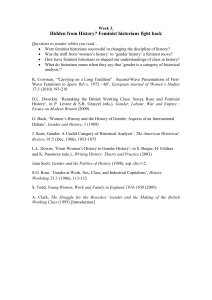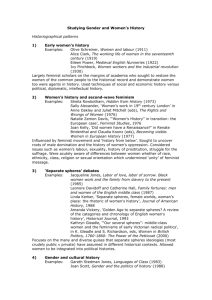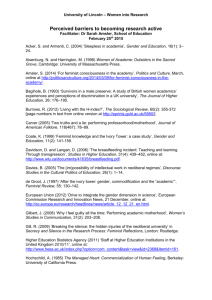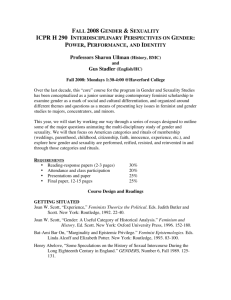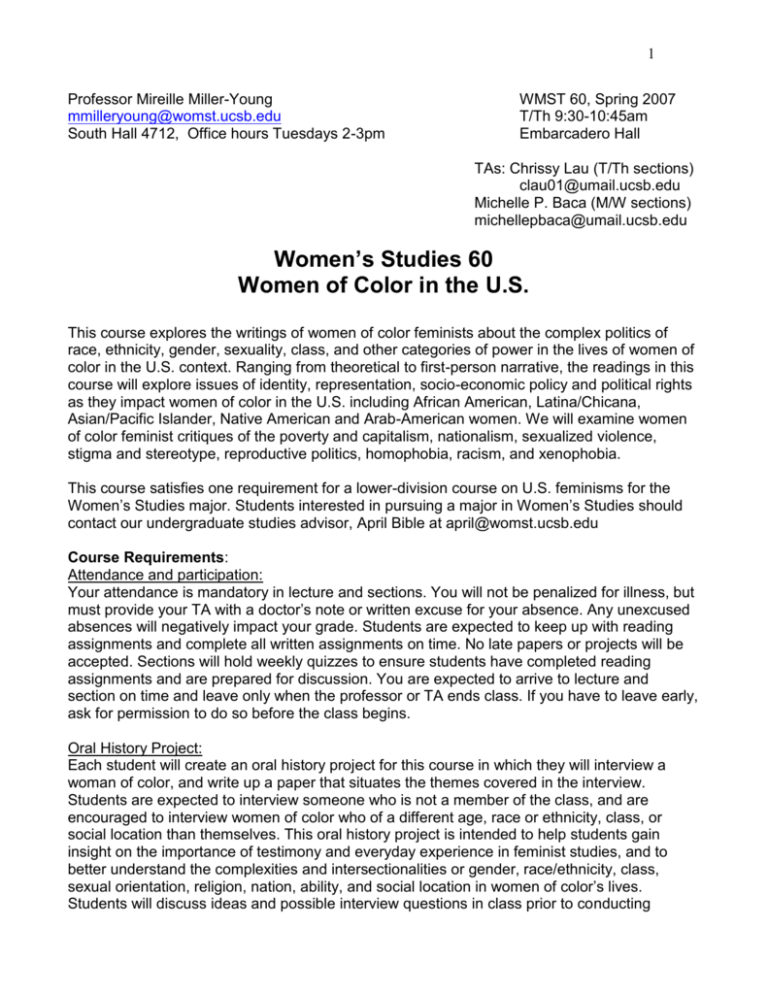
1
Professor Mireille Miller-Young
mmilleryoung@womst.ucsb.edu
South Hall 4712, Office hours Tuesdays 2-3pm
WMST 60, Spring 2007
T/Th 9:30-10:45am
Embarcadero Hall
TAs: Chrissy Lau (T/Th sections)
clau01@umail.ucsb.edu
Michelle P. Baca (M/W sections)
michellepbaca@umail.ucsb.edu
Women’s Studies 60
Women of Color in the U.S.
This course explores the writings of women of color feminists about the complex politics of
race, ethnicity, gender, sexuality, class, and other categories of power in the lives of women of
color in the U.S. context. Ranging from theoretical to first-person narrative, the readings in this
course will explore issues of identity, representation, socio-economic policy and political rights
as they impact women of color in the U.S. including African American, Latina/Chicana,
Asian/Pacific Islander, Native American and Arab-American women. We will examine women
of color feminist critiques of the poverty and capitalism, nationalism, sexualized violence,
stigma and stereotype, reproductive politics, homophobia, racism, and xenophobia.
This course satisfies one requirement for a lower-division course on U.S. feminisms for the
Women’s Studies major. Students interested in pursuing a major in Women’s Studies should
contact our undergraduate studies advisor, April Bible at april@womst.ucsb.edu
Course Requirements:
Attendance and participation:
Your attendance is mandatory in lecture and sections. You will not be penalized for illness, but
must provide your TA with a doctor’s note or written excuse for your absence. Any unexcused
absences will negatively impact your grade. Students are expected to keep up with reading
assignments and complete all written assignments on time. No late papers or projects will be
accepted. Sections will hold weekly quizzes to ensure students have completed reading
assignments and are prepared for discussion. You are expected to arrive to lecture and
section on time and leave only when the professor or TA ends class. If you have to leave early,
ask for permission to do so before the class begins.
Oral History Project:
Each student will create an oral history project for this course in which they will interview a
woman of color, and write up a paper that situates the themes covered in the interview.
Students are expected to interview someone who is not a member of the class, and are
encouraged to interview women of color who of a different age, race or ethnicity, class, or
social location than themselves. This oral history project is intended to help students gain
insight on the importance of testimony and everyday experience in feminist studies, and to
better understand the complexities and intersectionalities or gender, race/ethnicity, class,
sexual orientation, religion, nation, ability, and social location in women of color’s lives.
Students will discuss ideas and possible interview questions in class prior to conducting
2
interviews. Each interview should be no longer than 30 minutes, must be transcribed from
audio or videotape, and must be presented as part of a paper that interrogates the issues
discussed in the oral history interview (5-7 pages). Due May 29 in class.
Take Home Midterm:
A take home final consisting of one or more essays on the first half of class readings will be
distributed Thursday May 3 and due Tuesday May 8.
Take Home Final:
A take home final consisting of one or more essays on all class readings will be distributed
Thursday June 7 and due Tuesday June 12.
Attendance, Participation, Quizzes:
Oral History Project:
Take Home Midterm:
Take Home Final:
20 %
15 %
25 %
40 %
Academic Integrity:
This class assumes that all participants are doing assignments with integrity. Plagiarism
occurs when a student intentionally or unintentionally copies without proper citation of
the ideas or words of another or hands in work that is not her or his own. Academic
dishonesty violates university regulations and is a reportable offence which can lead to
expulsion.
Important Deadlines:
April 27: Last day to drop classes
May 8: Midterm Due in class
May 29: Oral History Due in class
June 12: Final Due at Noon to TA mailbox in Wmst office, South Hall.
Readings:
A Reader will be available for purchase at Associated Students, located at Ucen 1531.
Phone: 893-4471. All readings will be in the Reader, unless otherwise noted.
Films we MAY screen in class:
Girlhood, Dir. Liz Garbus, 2002
The Fact of Asian Women, Dir. Celine Parrenas Shimizu, 2002
The Aggressives, Dir. Daniel Peddle, 2005
Senorita Extraviata, Lourdes Portillio, 2001
I’m the One that I Want, Margaret Cho, 2001
A Girl Like Me, Dir. Kiri Davis, 2006
Listen Up! New Voices of Reproductive Justice, N’Dieye Gray Danavall, 2004
No! Aishah Shahidah Simmons, 2006
Week 1 (4/3, 4/5):
Thurs 4/5:
Introduction to Women of Color Feminisms
3
bell hooks, “Talking Back” Making Face, Making Soul: Haciendo Caras: Creative and
Critical Perspectives by Feminists of Color, Gloria Anzaldua, ed, San Francisco: Aunt
Lute Books, 1990: 207-211.
Audre Lorde, “Age, Race, Class, Sex: Women Redefining Difference,” and “The
Master’s Tools Will Never Dismantle the Master’s House” in Sister Outsider, Freedom,
Ca: Crossing Press, 1984.
Cherrie Moraga, “La Guera,” This Bride Called My Back: Writings By Radical Women of
Color, Cherrie Moraga and Gloria Anzaldua, eds., 3rd ed, Berkeley: Third Woman Press,
2002: 24-33.
Alice Walker, “Definition of a Womanist,” Making Face, Making Soul: Haciendo Caras:
Creative and Critical Perspectives by Feminists of Color, Gloria Anzaldua, ed, San
Francisco: Aunt Lute Books, 1990: 370.
Genny Lim, “Wonder Woman,” This Bride Called My Back: Writings By Radical Women
of Color, Cherrie Moraga and Gloria Anzaldua, eds., 3rd ed, Berkeley: Third Woman
Press, 2002: 22-23.
Week 2 (4/10, 4/12):
Women of Color Critiques of Capitalism and the State
Tues 4/10:
Cherrie Moraga, “From Inside the First World: Forward, 2001” This Bride Called My
Back: Writings By Radical Women of Color, Cherrie Moraga and Gloria Anzaldua, eds.,
3rd ed, Berkeley: Third Woman Press, 2002: xv-xxxii.
El Comite de Mujeres Puertorriquenas, “In the Belly of the Beast: Puertorriquenas
Challenging Colonialism,” Sing, Whisper, Shout, Pray! Feminist Visions of a Just World,
M. Jacqui Alexander et al eds, Canada, Edgework Books, 2003: 125-136.
Combahee River Collective, A Black Feminist Statement,” This Bride Called My Back:
Writings By Radical Women of Color, Cherrie Moraga and Gloria Anzaldua, eds., 3rd ed,
Berkeley: Third Woman Press, 2002: 234-244.
Thurs 4/12:
Linda Burnham, “Racism in U.S. Welfare Policy: A Human Rights Issue,” Sing, Whisper,
Shout, Pray! Feminist Visions of a Just World, M. Jacqui Alexander et al eds, Canada,
Edgework Books, 2003: 58-77.
Miriam Ching Yoon Louie, “Mexican Immigrant Women Workers,” Sing, Whisper, Shout,
Pray! Feminist Visions of a Just World, M. Jacqui Alexander et al eds, Canada,
Edgework Books, 2003: 438-488.
Week 3 (4/17, 4/19):
Women of Color, Poverty, Prison, and Stories of Survival
4
Tues 4/17:
Angela Davis, “Masked Racism: Reflections on the Prison Industrial Complex,” Sing,
Whisper, Shout, Pray! Feminist Visions of a Just World, M. Jacqui Alexander et al eds,
Canada, Edgework Books, 2003: 52-57.
(SKIM) Kaaryn Gustafson, “To Punish the Poor: Criminalizing Trends in the Welfare
System,” Women of Color Resource Center Working Paper #3 (2003)
http://www.coloredgirls.org/publications/workingpapers.htm
Sonia Sanchez, bluebirdbluebirdthrumywindow
Nellie Wong, Emergency Poem
Thurs 4/19:
Angela Davis, “Excerpts from Angela Davis: An Autobiography,” The Angela Davis
Reader, Joy James, ed. Malden, MA: Blackwell, 1998: 29-38.
Mie Lewis, “Who Cares for Incarcerated Girls?” Tompaine.com, March 7, 2007.
Siobhan Brooks, “Black Feminism in Everyday Life: Race, Mental Illness, Poverty and
Motherhood,” Colonize This! Young Women of Color on Today’s Feminism, Daisy
Hernandez and Bushra Rehman, Emeryville, Ca: Seal Press, 2002: 99-118.
Gloria Lockett, “What Happens When You Are Arrested,” Sex Work: Writings by Women
in the Sex Industry, 2nd ed. Frederique Delacoste and Pricilla Alexander, eds., San
Francisco: Cleis, 1998: 39-40.
Week 4 (4/24. 4/26):
Women of Color and Reproductive Rights
Tues 4/26:
Jael Silliman, Marlene Gerber Fried, Loretta Ross, and Elena R. Gutierrez, “Chapter 1,
Women of Color and Their Struggle for Reproductive Justice,” Undivided Rights:
Women of Color Organize for Reproductive Justice, Cambridge, Ma: South End Press,
2004: 1-23.
Angela Davis, “Reproductive Rights” Introduction to Women’s Studies: Gender in a
Transnational World, Inderpal Grewal and Caren Kaplan, McGraw Hill, 2002: 110-113.
Judith Scully, “Cracking Open Crack: Unethical Sterilization Movement Gains
Momentum” Population and Development Program, Hampshire College, no. 2, Spring
2000:(1-7).
Pricilla Huang, “Which Babies Are Real Americans?” TomPaine.com, Feb 20, 2007.
http://www.tompaine.com/articles/2007/02/20/which_babies_are_real_americans.php
Thurs 4/26:
5
Angela Davis, “Surrogates and Outcast Mothers: Racism and Reproductive Politics in
the Nineties,” The Angela Davis Reader, Joy James, ed. Malden, MA: Blackwell, 1998:
210-221.
National Latina Health Organization, “Norplant Information Sheet,” Introduction to
Women’s Studies: Gender in a Transnational World, Inderpal Grewal and Caren
Kaplan, McGraw Hill, 2002: 149-151.
Patricia Justine Tumang, “Nasaan ka anak ko? A Queer Filipina-American Feminist’s
Tale of Abortion and Self-Recovery,” Colonize This! Young Women of Color on Today’s
Feminism, Daisy Hernandez and Bushra Rehman, Emeryville, Ca: Seal Press, 2002:
370-381.
Week 5 (5/1, 5/3): Women of Color Against Violence
ß
Tues 5/1:
Antonia Castenda, “Sexual Violence in the Politics and Policies of Conquest:
Amerindian Women and the Spanish Conquest of Alta California,” Building With Our
Hands: New Directions in Chicana Studies, Aldea dela Torre and Beatriz Pasquera,
eds. Berkeley: University of California Press, 1993: 15-23.
Antonia Castenda, “History and the Politics of Violence Against Women,” Living
Chicana Theory, Carla Trujillo, ed., LPC Press, 1997: 310-319.
Deena Gonzalez, “Lupe’s Song: On the Origins of Mexican-Woman-Hating in the United
States,” Velvet Barrios, Gasparde Alba, ed., Palgrave, 2002: 251-264.
Thurs 5/3:
Angela Davis, “The Color of Violence Against Women,” Sing, Whisper, Shout, Pray!
Feminist Visions of a Just World, M. Jacqui Alexander et al eds, Canada, Edgework
Books, 2003: 30-36.
Beth Richie, “Battered Black Women: A Challenge for the Black Community,” Words of
Fire: An Anthology of African-American Feminist Thought, Beverly Guy-Sheftall, ed.,
New Press, NY, 1995: 398-404
Week 6 (5/8, 5/10):
Women of Color Against Sexual Violence
Tues 5/8:
Midterms Due, no reading
Thurs, 5/10:
Margaret Abraham, “Chapter 5: Sexual Abuse,” Speaking the Unspeakable, New
Brunswick: Rutgers University Press, 2000: 86-105.
6
Andrea Benton Rushing, “Surviving Rape: A Morning/Mourning Ritual” Feminist Theory
and the Body: A Reader, Janet Price and Margrit Shildrick, eds., New York: Routledge,
1999: 371-380.
Cherrie Moraga, “ For the Color of My Mother,” This Bride Called My Back: Writings By
Radical Women of Color, Cherrie Moraga and Gloria Anzaldua, eds., 3rd ed, Berkeley:
Third Woman Press, 2002.
Week 7 (5/15, 5/17):
Women of Color Feminisms on Sexual Identity
Tues 5/15:
Yen Le Espiritu, “’We Don’t Sleep Around Like White Girls Do’: Family, Culture, and
Gender in Filipina American Lives,” Women: Images and Realities, 3rd ed. Amy
Kasselman et. al, McGraw Hill, 2003: 153-60.
Audre Lorde, “Uses of the Erotic: The Erotic as Power,” in Sister Outsider, Freedom,
Ca: Crossing Press, 1984.
Thurs 5/17:
Leah Lakshmi, “browngirlworld: queergirlofcolor organizing, sistahood, heartbreak,”
Colonize This! Young Women of Color on Today’s Feminism, Daisy Hernandez and
Bushra Rehman, Emeryville, Ca: Seal Press, 2002: 3-16.
Yolanda Chavez Leyva, “Breaking the Silence: Putting Latina Lesbian History at the
Center,” Unequal Sisters, Ruiz and DuBois eds, 403-408.
Week 8 (5/22, 5/24):
Women of Color Take on Representations in the Media
Tues 5/22:
Imani Perry, “Who(se) Am I? The Identity and the Image of Women in Hip Hop,” Gender, Race
and Class in the Media, Gail Dines and Jean Humez, eds. Thousand Oaks: Sage, 2003:136148.
Thurs 5/24:
Lynn Lu, “Critical Visions: the Representation and Resistance of Asian Women,” Dragon
Ladies: Asian American Feminists Breathe Fire, Boston: South End, 1997: 17-27.
Week 9 (5/29, 5/31):
Women of Color and Sexual Rights
Tues 5/29:
Oral History Project Due in Class, no reading
Thurs 5/31:
7
Rachel West, “U.S. PROStitutes Collective,” Sex Work: Writings by Women in the Sex
Industry, 2nd ed. Frederique Delacoste and Pricilla Alexander, eds., San Francisco:
Cleis, 1998: 279-289.
Mireille Miller-Young, “Women of Colour in the American Porn Industry,” $pread
Magazine, vol. 1, no. 1, 2005: 26-30.
Mireille Miller-Young, “Hardcore Desire: Black Women Laboring in Porn,” Colorlines
Magazine, vol. 8, no. 4, Winter 2005-2006: 31-35.
Mireille Miller-Young, “An Interview with Sasha Brabuster: Pleasures, Dangers, and
Good Advice,” $pread Magazine, vol. 2, no. 1, Spring 2006: 16-21,71.
Evelynn Hammonds, “Missing Persons: African American Women, AIDS, and the
History of Disease,” Words of Fire: An Anthology of African-American Feminist Thought,
Beverly Guy-Sheftall, ed., New Press, NY, 1995: 434-449.
Week 10 (6/5, 6/7):
Wrap Up- Frontiers of Women of Color Feminisms
Tues 6/5:
Gloria Anzaldua, “La Conciencia de la Mestiza: Towards a New Consciousness,”
Making Face, Making Soul: Haciendo Caras: Creative and Critical Perspectives by
Feminists of Color, Gloria Anzaldua, ed, San Francisco: Aunt Lute Books, 1990: 377389.
bell hooks, “Sisterhood: Political Solidarity Between Women,” Feminist Theory: From
Margin to Center, Boston: South End Press, 1984: 43-65.
Kimberle Crenshaw, “Mapping the Margins: Intersectionality, Identity Politics, and
Violence Against Women of Color,” Introduction to Women’s Studies: Gender in a
Transnational World, Inderpal Grewal and Caren Kaplan, McGraw Hill, 2002: 207-213.
Thurs 6/7:
Last class, wrap up.
Tuesday June 12, Final Due at 12 noon.

